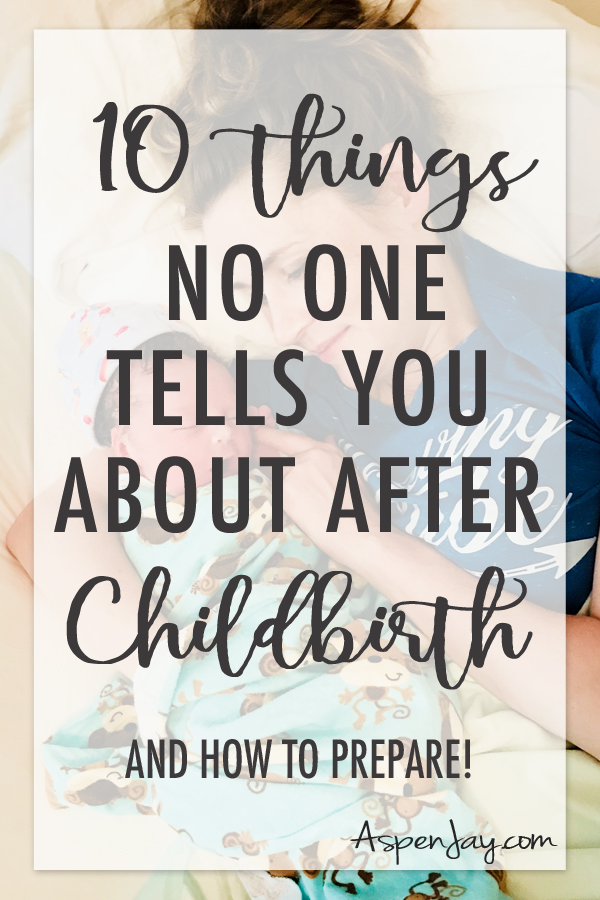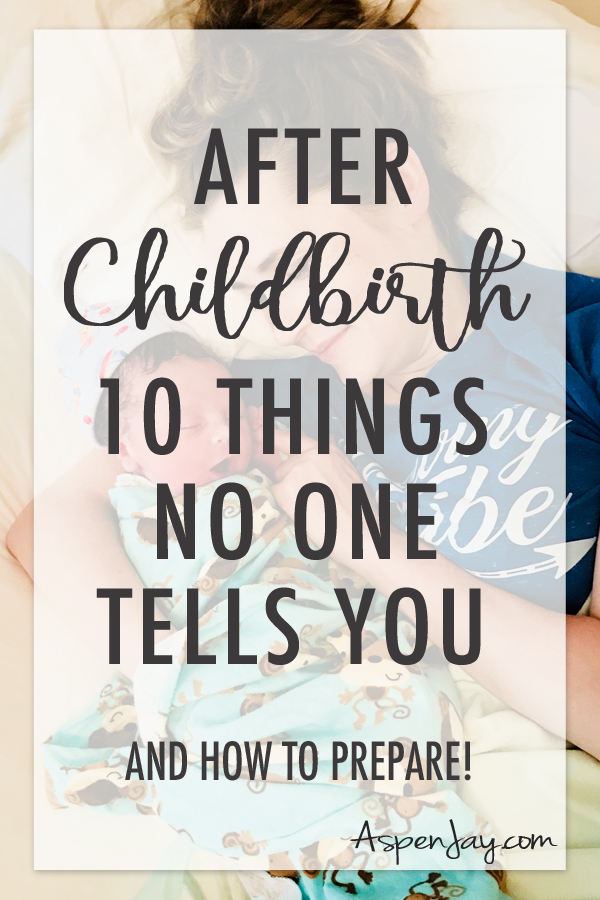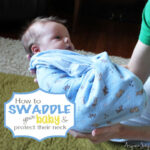Delivery was hard enough but what about all that happens after giving birth? Here is a list of 10 things no one tells you about after and how to prepare! This post contains affiliate links of products/services that I personally recommend. You will not be charged extra should you choose to purchase through any of the links.

Hello friends! In case you missed it and have been curious about what’s been going on around here, we recently had a baby! My little babe and I are doing well. We just hit the 3-month mark so are ready to come off our maternity leave.
It’s funny how over the space of time you can quickly forget certain things. It has been over four years since my last childbirth experience and I had forgotten the reality of many things that come from having a new little one. The nights of sparse sleep, the diaper blowouts, the constant need to change both the baby’s and my clothes due to spit up everywhere and the list goes on. Although a distant memory since my second child, these occurrences weren’t a surprise to me before having my first child. Most everyone shares experiences with such things, even the actual birth is talked about by people.
But there were several things that I was completely in the dark about when it came to what occurred after giving birth.
I guess people just assume it’s common knowledge or perhaps they are too shy to talk about it. Whatever the reason, I thought it might be helpful to shed some light for those who may still be in the dark about what all takes place after giving birth, and how to prepare yourself for it.
After Giving Birth
The Honeymoon Stage
Following the miraculous birth of each of my three babies, my body is running on endorphins. I am utterly smitten by this new precious bundle in my arms and am totally content spending hours upon hours looking at him. I like to refer to the first 24 hours after the birth as the ‘honeymoon stage.’ The waiting is over and the baby is finally in my arms. The baby is still surviving on the food he received while inside me and he isn’t even pooing or peeing all that much.
I call this a HUGE blessing. God gave this very special period of time to help overshadow the nine months of pregnancy and/or the birth that may have been extremely hard.
Life couldn’t be better right? (If you don’t feel this way, it may also be normal and is addressed later in this article)
Sadly as we all know, honeymoons eventually end and the events of daily life come back in full swing. Yes the dirty diapers and late night feedings come into play, but there are a few things that accompany childbirth that as a first timer, you may be completely clueless about.
Let me enlighten you about 10 things no one tells you about after giving birth.
1. More Contractions
Me: “Wait, what?! More contractions! I thought the contractions were over after I gave birth?!”
Yep, you heard right. Contractions will continue for up to a few days after the birth. With your first, you may not feel them at all, which was my case. But with each baby thereafter, the afterbirth contractions progressively grow a little more intense and last a bit longer. It’s not a walk in the park, but it’s all for a good purpose.
Those post delivery contractions are contracting the uterus back down to its pre-pregnancy size. Your uterus is about the size of your fist. Now imagine blowing it up like a balloon in order to fit your baby inside. Once the baby is out, your uterus is in a sense “deflated” and is just a big floppy balloon. The first time around the uterus can bounce right back. But with each expansion, it gets a little tougher for it to scale down in size. That’s where the contractions step in.
With each contraction, the uterus is contracted or reduced in size.
I noticed with my recent birth, the post birth contractions were at the same scale as some of my labor contractions. Not as rough as the really hard ones but not as light as the first ones. It was good to know beforehand that I would be getting contractions, otherwise I may have thought something was wrong. To endure them, just like with pre-birth contractions, I would breathe through each one and enjoy the breaks in between.
Taking B-100 vitamins, Calcium & Magnesium, or Motrin may also be helpful. If you decide to take Motrin, remember your milk is not going to be in for two to three days, so you will want to stop taking it by the time your supply comes in so the baby doesn’t get as much or any of the drug. If you decide not to, like I did, the B-100 vitamins and Calcium & Magnesium ease the stress and take a little of the edge off of the contractions.
And of course the knowledge that they won’t last forever was a big comfort!
2. Bleeding Follows
Me: “So my period immediately starts up again?”
Well, not exactly. Your body just went through a MAJOR traumatic experience. Aside from pushing an adorable large bundle through a tiny hole, you also have a sizable wound (can be up to 16 inches in diameter) in your body from where the placenta was attached to your uterine wall. In this healing process, your body will bleed for a few days. It is good to see some type of blood (even a speck) for the first three days, otherwise it may be a sign of infection. The bleeding may last up to a few weeks and will gradually decrease in amount.
During this time of bleeding you will want to keep your vagina area very clean to prevent infection. So don’t use tampons. Pads are fine but may not be enough at first. What I have found that works well (this may warrant another bullet point) is, eh hem, grandma diapers. Yes, you read that correctly. I just have my husband pick them up for me so I don’t have to be seen with them. 😉 Be sure to change them every time you use the bathroom, just to be safe and free from possible infection.
A word to the wise, it’s not necessary to bleed for six weeks or more after giving birth. I know many women who think this is normal. It’s not, and with proper care it can be avoided.
My bleeding stopped about two weeks after I gave birth. How? I let my body recover. I stayed down for the first 10 days. Only rising to go to the bathroom and stretch my legs a little around the room. After that I was still very careful. I rested often, freed myself of any added obligations, limited my use of the stairs, and the heaviest thing I carried was my baby. About six weeks after giving birth, I noticed I was a little spotty. Thinking back of what I had done, I pinpointed what caused the onset of bleeding. Two days earlier, I had made a trip to the store and had carried the baby while in the car seat. My body was politely telling me that I was not ready for such endeavors. I took it easy for the next few days and the bleeding completely stopped.
So, take note of what your body is telling you.
Your body, aside from growing a human for about nine months, went through quite a lot and needs time to heal. Having a baby should be treated as if major surgery had been done. You wouldn’t immediately stand up on the leg that was recently operated on, would you?
We all know those mothers who rest a day or two and then jump back into the full swing of things. This might look good on the surface but it is definitely taking a toll on their body. If they don’t feel it shortly after, they will definitely feel it later down the road i.e. prolapsed uterus, postpartum depression, excessive bleeding, etc. Listen to your body and please don’t let anyone cause you to feel like a wimp because you are still taking it easy after the birth.
I understand that many may not have the luxury of staying down as long as I did. But definitely do your best! Make meals prior to birth, forget about the dirty dishes (use paper plates), and most of all, ask for help!
3. Using the Bathroom can be Frightening
Me: “It feels like my bottom is going to fall off!”
During birth, you do a substantial amount of pushing to squeeze your baby through a tiny opening. With all that pressure, you may have also cleaned out your colon. So the need to have a bowel movement may not be felt for a day or two. But when the need does arise, it can be a bit scary. All that pushing and pressure made it quite sore in that general area and your insides are a bit disturbed. For me, I was feeling that same heaviness I felt when my baby was descending. It actually felt like I was liable to push out an organ or two! It may help to gather up a wad of toilet paper and press it gently against the perineum (the tissue between the vagina and the anus) while going.
Aside from having a bowel movement, going pee is quite the ordeal. During this time of healing, it is very important to keep everything as clean as possible. Instead of using toilet paper, use a perry bottle to rinse yourself off with water. If you have stitches or any skid marks, spraying the water while you are peeing dilutes the urine, which will help ease the stinging/burning. I also add a little squirt of hibiclens to the water in the perry bottle for added protection against infection. Be sure to make it warm water or it can be a little startling.
4. Your Tummy is Still Big
Me: “I still look like I’m several months pregnant!”
Sad but true, your tummy doesn’t all of a sudden shrink back down to size.
But don’t be hard on yourself! Your body just created a human and it survived the trauma of giving birth. Take a minute to congratulate your body on a job well done!
Your insides are all over the place and your stomach muscles have separated quite a bit. It takes time, rest, and the proper exercises for things to heal. Busting out with several sets of crunches right off isn’t going to help and may make it worse.
A bellyband helps kick start the healing process. It holds everything in so your body doesn’t have to work so hard putting everything back in place. Oh and by the way, the bellyband can also cut down on the afterbirth contractions.
Before I start any cardio exercise routine I like to wait a bit until my muscles, ligaments, and sockets are more stable and all the bleeding stops. And as far as exercise goes, be sure to choose carefully, because jumping back into crossfit, running or even yoga might not be the best thing for your body.
Ever heard of diastasis recti?
It’s when the stomach (rectus abdominis) muscles that hold in your internal organs and stabilize your core, separate. This is an occurrence that takes place during pregnancy to make room for your growing baby.
In the first three to six weeks after delivery, these muscles come back together naturally for some mothers. For others, the muscles do not and they are forever left with the “3-6 month pregnant” look. Much to my chagrin, I happen to be in the latter group. 🙁
The amount of separation after giving birth can be minimized if during and after pregnancy you are mindful of those muscles and do everything you can to not separate them more. Even simple things like using those muscles to sit straight up in bed or lifting or carrying something heavy can enlarge the gap, not to mention traditional core exercises like planks and crunches. That’s why it is so important to not just pick any old exercise routine.
I know it’s very discouraging to say the least!
But thankfully those muscles can be repaired! One method that I have found helpful is the Mutu System. The Mutu System focuses on your body as a whole, your core muscles, as well as others. The TummyTeam is another system that I have heard really good things about.
5. Your Breasts get really, REALLY large!
Me: “I’m HUGE!”
After birth, your breasts miraculously produce colostrum. This is wonderful for your baby. The colostrum helps build the baby’s immune system. It contains great probiotics, acts as a cleanser to clear out all the meconium, and is an emetic, which causes vomiting if the baby swallows something during birth that shouldn’t be there. It is AMAZING stuff!
Then after a few days (if it’s your first baby, it may take longer) your milk comes in…
And does it ever!
Your body creates an overabundance of milk (enough for twins at first) to the point of great discomfort as it tries to figure out how much your baby needs. This is referred to as “engorgement” and occurs about two to three days after giving birth. Your breasts are literally filled to the brim.
Your baby will be your saving grace during this period. Nurse, nurse, nurse!
If you feel any hard spots on your breasts, be sure to rotate the position of your nursing baby to put his chin to where the harder area is. This is his strongest suck so it will help clear out the milk duct that might be clogged. I have also found placing warm compresses on your breast before feeding helps to loosen any firm spots. The warm compresses are just towels heated with warm water, being sure to ring out the excess water, and using a dry heated towel to finish so you don’t catch a cold. If baby isn’t enough, you may also want to express a little milk just to take the edge off. But use this as a last resort because expressing too much will add to your milk production.
It is so critical to take care of yourself during the 3-4 days of engorgement to avoid getting mastitis. Believe me you DO NOT want to go down that path! If you do, you will be infected with it again and again. I fell victim to mastitis shortly after having my first child and I had it off and on for an entire year. It was horrible.
Rest, eat well, and make sure no one bumps you! This too shall pass.
6. Breast Feeding isn’t always a Cakewalk
Me: “I thought nursing came, well… naturally?”
There is a reason why people write books about breastfeeding. It really is an art that must be done correctly and although it is completely natural it doesn’t always come naturally. The baby’s latch (how the baby holds onto the nipple) needs to be just right or it will leave both the baby and mama frustrated (and can cause the mama pain!).
Some babies may be tongue or lip-tied, this is when the frenulum (little lap of skin underneath the tongue) comes out to far on the tongue. So when your baby sticks out her/his tongue the tip of the tongue can look like a little heart, it will pull in. This prevents the baby from latching on properly, which causes nursing to be painful for the mama and hinders the baby from receiving enough nourishment. Stretching, clipping, or laser, depending on the severity, can correct this condition and it’s best to have it taken care of in the first three to four days before habits are developed. A dentist is your best source for the laser procedure; however make sure he has experience in this.
My 2nd and 3rd babies latched on quickly after birth and didn’t have a problem nursing, but this wasn’t the case with my first. He was 3 ½ weeks early (early babies often have difficulty latching on properly), he had a tough time learning how to nurse and being my first, I didn’t have a clue how to help him.
Thankfully I received coaching from my midwife during the first several days and she would occasionally check to make sure the baby was nursing correctly. Definitely ask for help your first go around. Your breasts may be sore at first as they are adjusting to the change but eventually nursing should not hurt, if it does, something is not right and you may want to ask for help. The La Leche League and Gold Lactation are great resources for aid and literature on breastfeeding.
7. Hormones Run Awry
Me: “I’m sweating in all strange places!”
After childbirth, your hormones are a little out of whack. You may suffer from fatigue, hair loss, dry skin, itching, inability to lose weight, excess sweating, mood swings, anxiety, to name a few. These are all symptoms of a hormonal imbalance.
Your body is working to return your hormone levels back to normal and there are a few things you can do to aid in this endeavor. Fill your plate with healthy food, leafy greens, lots of fresh fruits and vegetables. Drink green smoothies! If you can buy organic, great! Eat grass fed meat and chickens that are free range. Make sure you are getting the vitamins, minerals, fatty acids, probiotics, and enzymes you need, such as vitamin C and B-100s
, Calcium & Magnesium
, Omega-3 and a good digestive aid
. Above all, be sure that you are staying hydrated with plenty of water.
Shortly after my second child was born, my hands started itching intensely. I found myself itching until blood would show, even in my sleep. My midwife suggested taking vitamin D3, and within a week of taking it the itching stopped completely! If ever I missed even a day of taking vitamin D3, the itching would start up again.
8. Postpartum Depression can affect the Strongest
Me: “Why am I not as happy as I used to be?”
This is one that I hope you will never experience, but postpartum depression is definitely worth talking about so you can be aware of it. Many mamas experience the “baby blues” a few days after giving birth. Baby blues may include crying spells, mood swings, trouble sleeping, anxiety, and feeling overwhelmed. It’s nothing to be too concerned about, as it doesn’t last very long, a few days is all, two weeks at the most.
Postpartum depression lasts longer and has more severe symptoms. It can start off with prolonged baby blues or other things like feeling anxious, worried for no good reason or being so unhappy you are unable to sleep. It’s important to watch for the signs so that you can take care of them before they increase. You know it has escalated to postpartum depression if you begin to have thoughts of harming yourself or your baby.
Taking B-100 vitamins, getting enough sleep, eating well, drinking plenty of water, walking outside in nature, writing in a journal, and receiving help will decrease your chances of developing postpartum depression. If you have postpartum depression, doing the above mentioned things help you overcome it. There are those cases when some women may need to receive professional help.
Acknowledging that there is a problem and voicing what you are feeling is the beginning of healing!
9. Becoming an Overprotective Mama Bear
Me: “What if I don’t want to share my baby?”
You know how defensive mama bears are to their young? Just wait until your baby arrives! You will become an overly protective mother bear yourself and that is totally normal!
It’s all right to say “no” to guests or extended family members who want to hold your newborn baby if you don’t want them to. The little one has been inside you for the last nine months and the connection between you two is very strong.
I had a friend come over to help after having my first. She offered to watch the baby while I slept. The intentions were good but it actually made matters worse. I couldn’t sleep at all because my baby wasn’t with me. It didn’t help when I discovered that he wasn’t even being held but was asleep in a crib. I was furious!!! My baby was ‘taken’ from me and wasn’t even getting snuggled. Sounds extreme, but those feelings were real. My friend sincerely wished to help and did so with what she would have wanted. She would have happily done anything I asked, had I voiced my needs.
These mama bear feelings are strongest when your baby first arrives but will tone down after a few weeks so you will be more open to sharing.
When people extend their aid, let them know the best way they can help you. If you know before the birth, let friends and family know before the baby even arrives.
For me, I want my baby close to me all the time for the first four weeks. So offering to “hold my baby so you can sleep” does more harm than good. But volunteering to clean my house or make my family and me food? Definitely good help! After that time frame, I am ready to get back to a few daily chores and would love the help of holding my little one. Everyone is different that’s why it’s important to voice your personal needs.
10. You cannot get enough of your Baby
Me: “Sleep? Nah. I would much rather look at and snuggle my baby!”
You will become completely smitten with the new little one and you won’t be able to stop starring. Nothing will be as important to you as holding your baby and memorizing his every single feature. This time period, especially the first hour after giving birth, which is referred to as the ‘golden hour’, is special and important for both you and your baby. Your emotions are all over the place and you need this time to heal. The whole birthing experience wasn’t easy on the baby either. Remember he was the one that had to squeeze through a very small hole, not to mention, the change of environment. So surrounding him with anything familiar is important. And what is familiar to him? You. He needs to hear your voice, feel your touch, and discern your love. In another words, he needs you as much as you need him.
This mama and baby bonding period is so critical and is not to be rushed.
What if you aren’t feeling this? Some mothers due to a traumatic birth, a c-section, other medical or emotional reasons aren’t able to experience the golden hour to bond with their baby. If this is your case and you feel disconnected from your baby, this can be healed! You can still experience the golden hour later, repairing what was damaged during and/or after the birth. If you need more help on this, I suggest this webinar series.
Even if all went well during and after the birth and you enjoyed the ‘golden hour’ you can still start to feel disconnected from your little one. If this happens you may want to readjust your schedule, cut out things that are stressful and be sure you are eating well to help get those hormones we talked about earlier normalized so you can feel that connection again.
Above all, enjoy every moment; the baby won’t be little forever!

What has been your experience after giving birth? Did anyone prep you for all of this? Let me know!
The content is not intended to be a substitute for professional medical advice, diagnosis, or treatment. Always seek the advice of your physician or other qualified health provider with any questions you may have regarding a medical condition.




I never knew that contractions can still happen a few days after I give birth until you mentioned it. Reading these things you mentioned in this article made me realize that I should take pregnancy seriously and look after myself. Once we confirm that I am pregnant, I’ll be sure to tell my husband to invest in prenatal care to ensure that I’ll have a smooth delivery and aftermath.
Hi Zoe!
Congrats on your possibility of being pregnant! That is very exciting! Yes most definitely take care of yourself during the pregnancy, it will make such a difference and proper knowledgable prenatal care. I had NO idea about the contractions either, it’s crazy@ You would think after delivery you would get a break, but nope! But at least you don’t feel it much with the first. 🙂
Excellent information, thank you! I wish I had seen it with my first.
Thanks Tabitha! Me too! 😉
What a wonderful resource for new and experienced mothers going through birth again.